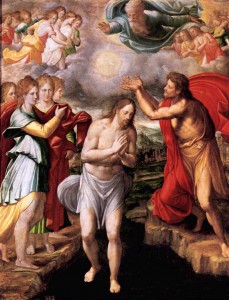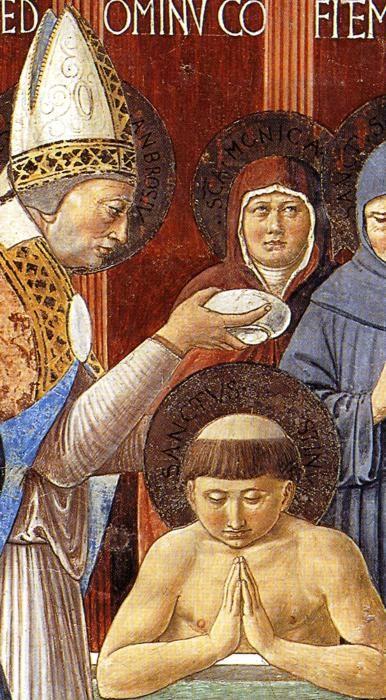 We continue our Patristic Rosary Project today with the:
We continue our Patristic Rosary Project today with the:
1st Luminous Mystery: Baptism of Jesus by John
The one God had sent to prepare the way and whom Christ Himself described as the greatest man born of woman, was a focus of much contemplation by the Fathers and we can only touch the surface of their comments. Chromatius (+c.406), Bishop of Aquileia, wrote of the Baptist and his significance for us:
Hence John prepared these ways of mercy and truth, faith and justice. Concerning them, Jeremiah also declared, “Stand by the roads, and look, and ask for the ancient paths, where the good way is, and walk in it. (Jer 6:16) Because the heavenly kingdom is found along these ways, not without good reason John adds, “The kingdom of heaven is near.” (Mt 3:2) So do you want the kingdom of heaven to also be near for you? Prepare these ways in your heart, in your senses and in your soul. Pave within you the way of chastity, the way of faith and the way of holiness. Build roads of justice. Remove every scandal of offense from your heart. For it is written: “Remove the stones from the road.” (Is 40:4) And then, indeed, through the thoughts of your heart and the very movement of your soul, Christ the King will enter along certain paths. [Tractate on Matthew 8.1]
Why Christ submitted to baptism was a puzzle to the Fathers. Christ, who had no need of baptism, received baptism by water. Hilary of Poitiers (+367) spoke about Christ’s effect on the water, rather than its effect on Him:
In Jesus Christ we behold a complete man. Thus in obedience to the Holy Spirit the body he assumed fulfilled in him every sacrament of our salvation. He came therefore to John, born of a woman (Cf. Gal 4:4), bound to the law and made flesh through the Word. (Cf. Jn 1:14) Therefore there was no need for him to be baptized, because it was said of him: “He committed no sin.” (1 Pet 2:22) and where there is no sin, the remission of it is superfluous. It was not because Christ had a need that he took a body and a name from our creation. He had no need for baptism. Rather, through Him the cleansing act was sanctified to become the waters of our immersion. [On Matthew 2.5]
Jerome (+420) also comments on this mystery:
For three reasons the Savior accepted baptism from John. First, because He was born a man, that He might fulfill all justice and humility of the Law. Second, that by His baptism He might confirm John’s baptism. And third, that by sanctifying the waters of the Jordan through the descent of the dove, he might show the Holy Spirit’s advent in the baptism of believers. [Commentary on Matthew 1.3.13]
One of the remarkable things occurring at the baptism of Jesus is the sound of the Voice. Here is Hilary again:
A voice from heaven thus spoke: “This is my beloved Son, in whom I am well pleased.” (Mt 3:17) God’s Son is manifested both by hearing and by sight. Both the witnesses of contemplation and the spoken word are sent from the Lord to an unfaithful people who disregard the prophets. At the same time, we know from those who were immersed in Christ that after baptism with water the Holy Spirit would descend to us from the heavenly gates. Then we would be filled with the anointing of heavenly glory and become God’s children through the adoption the Father’s voice announced. Truth prefigures the image of the sacrament through these very happenings. [On Matthew 2.6]
 The great bishop of Hippo, the Doctor of Grace, St. Augustine (+430) spoke about the Trinitarian dimension of this mystery:
The great bishop of Hippo, the Doctor of Grace, St. Augustine (+430) spoke about the Trinitarian dimension of this mystery:
Here then we have the Trinity presented in a clear way: the Father in the voice, the Son in the man, the Holy Spirit in the dove. This only needs to be barely mentioned, for it is so obvious for anyone to see. Here the recognition of the trinity is conveyed to us so plainly that it hardly leaves any room for doubt or hesitation. The Lord Christ Himself, who comes in the form of a servant to John, is undoubtedly the Son, for here no one can mistake Him for either the Father or the Holy Spirit. It is the Son who comes. And who could have any doubt about the identity of the dove? The Gospel itself most plainly testifies: “The Holy Spirit descended upon Him in the form or a dove.” So also there can be no doubt whose voice it is who speaks so personally: “You are my beloved Son.” So we have the Trinity distinguished…. Here are the three Persons of the Trinity distinguished: When Jesus came to the river, He came from one place to another. The dove descended form heaven to earth, from one place to another. The very voice of the Father sounded neither from the earth nor from the water but from heaven. These three are as it were distinguished in places, in offices and in works. But one may say to me, “Show me instead the inseparability of the triune God. Remember you who are speaking are a Catholic, and to Catholics you are speaking.” For thus does our faith teach, that is, the true the right Catholic faith, gathered no by the opinion of private judgment but by the witness of the Scriptures, not subject to the fluctuations of heretical rashness but grounded in apostolic truth. This we know, this we believe. This, though we do not see it with our eyes nor as yet with the hear, so long as we are being purified by faith, yet by this faith we most firmly and rightly maintain the Father, Son and Holy Spirit are a Trinity – inseparably one God, not three gods. But yet one God in such a way that the Son is not the Father, and the Father is not the Son, and the Holy Spirit is neither the Father nor the Son but the Spirit of the Father and of the Son. This ineffable Divinity, abiding ever in Itself, making all things new, creating, creating anew, sending, recalling, judging, delivering, this Trinity, I say, we know to be at once indescribable and inseparable. [Sermon 1.1.2 – c. 410-12]

































